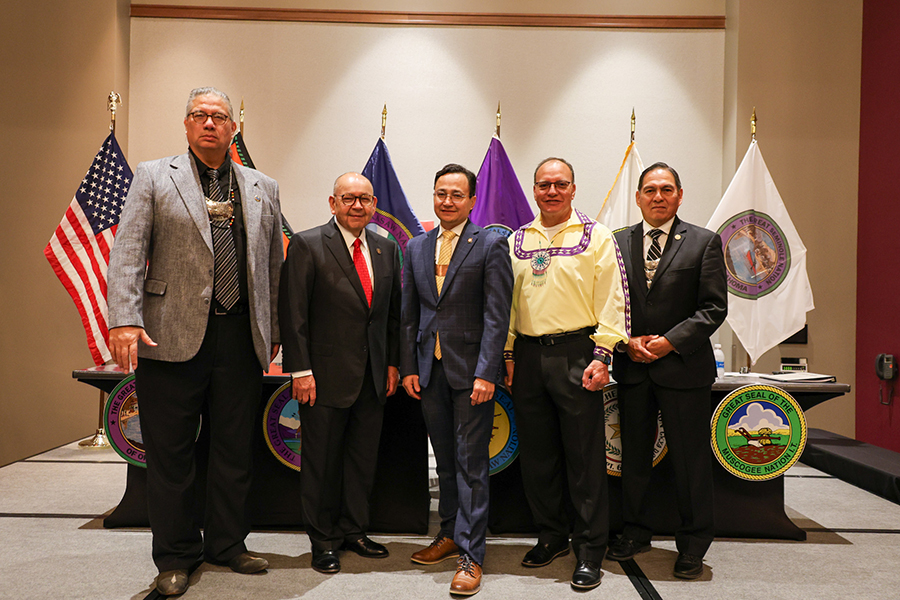CATOOSA, Okla. — Leaders of the Inter-Tribal Council of the Five Tribes met for their quarterly meeting at the Hard Rock Hotel & Casino Tulsa recently and unanimously passed several resolutions.
The ITC approved a resolution supporting the nomination of Sara Hill for the U.S. District Court for the Northern District of Oklahoma. President Joe Biden announced his intent to nominate Sara Hill, a Cherokee Nation citizen and the tribe’s former Attorney General, for a judicial position on Oct. 18. Hill successfully led the tribe’s defense of the Indian Child Welfare Act in the U.S. Supreme Court case Brackeen v. Haaland, as well as helped the tribe navigate the evolving legal landscape following the McGirt decision. If approved, Hill will serve as the first female, Native federal judge. The Five Tribes unanimously passed the resolution of support for Hill.
“The nomination of Cherokee Nation citizen Sara Hill for the United States District Court for the Northern District of Oklahoma is a win for Indian Country and across the nation,” leaders of the Five Tribes said in a joint statement. “Hill adds diversity to the bench and is deeply knowledgeable about federal Indian law and is extremely qualified for this role. The Five Tribes urge the United States Senate to give speedy consideration and approval of this nomination.”
The ITC also approved a resolution supporting candidates for leadership positions within the National Congress of American Indians. NCAI is the oldest, largest and most representative American Indian and Alaska Native organization serving the broad interests of tribal governments and communities. The Council stated their support for Mark Macarro as President of NCAI, Shannon Holsey as Vice President, David Woerz as Treasurer, Muscogee Nation Principal Chief David Hill as Eastern Oklahoma Region Vice President of NCAI and Joe Deere as Eastern Oklahoma Regional Vice President Alternate for NCAI. This resolution was passed unanimously by the Five Tribes.
The ITC also unanimously passed a resolution regarding the use of competitive funding authorized by the Public Transportation on Indian Reservations Program, also known as the Tribal Transit Program. Tribal governments were urged to give recommendation by the Federal Transit Administration as to how funds from the Infrastructure and Jobs Act should be disbursed for the Public Transportation on Indian Reservations Program. The Five Tribes urge the FTA to utilize the competitive funds authorized solely on purposes of transit-vehicle expansion and replacement.
A resolution was also passed by ITC urging the U.S. Congress to reauthorize the Native American Housing Assistance and Self-Determination Act. NAHASDA, a bill that allows tribes to provide their citizens with critical housing services, was originally passed in 1996, but expired in 2013. The ITC urged Congress to include the Senate version of the NAHASDA reauthorization, which does not include any qualifying language that would unfairly target certain federally recognized tribes by restricting their use of funds.
ITC also passed a resolution supporting the current Southeastern Archaeological Conference image policy regarding the publication of photographs of funerary objects. The ITC supports the current image policy for Southeastern Archaeology, the journal of the SEAC, which fosters consultation between the research community and tribes when appropriate. The ITC unanimously passed this resolution.
The next ITC meeting will be hosted by the Muscogee Nation at the River Spirit Casino and Resort in Tulsa from Jan. 10 to Jan. 12, 2024.

